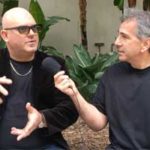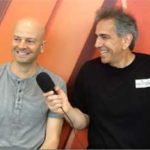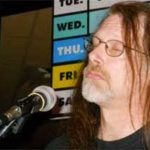First-hand talk of the “Infinite” possibilities of playing in Deep Purple
By Gary Graff
May 5, 2017
When Steve Morse signed on to Deep Purple as Ritchie Blackmore’s permanent replacement 24 years ago, eyebrows raised. How, after all, would a player from the prog, jazz and Americana worlds — previously with the Dixie Dregs, the Steve Morse Band, Angelfire and Kansas, and concurrently with the all-star Flying Colors — fit into what Deep Purple does. Pretty well, as it turns out; Morse has been part of the group’s last six studio albums, including the new Infinite, and a wealth of live releases. As bassist Roger Glover notes: “Steve really breathed some fresh life and energy into the band. He’s a great player, very confident, and he’s found a way to play Deep Purple music and still have some of his own style and flair.” But as easy as he’s made it look, it’s something Morse sweated over when he first joined the band — though any apprehensions are in the distant past, and an Infinite future certainly seems plausible…
FGPO: You’re nearing 25 years for yourself in Deep Purple. What’s your sense of your evolution in the band?
Morse: I guess what I do is provide lots of choices. I play what I think would fit as a fan, as just a fan of the music: “Here’s my best shot — but, if you don’t like that, I’ve got 10 other ways I can do it.” The theory is that the collective consciousness of the band would help steer it. The band lets me do what I do naturally, but I normally ask for some guidance. I don’t want to sound like the Dixie Dregs playing with Deep Purple. I want it to sound like Deep Purple.
FGPO: So guitar by committee?
Morse: [laughs] Sort of. For sure, the band is totally involved in everything. They have no problem saying no to me. When I do solos and stuff, the main one I can count on when [producer Bob] Ezrin isn’t around is Roger [Glover], ’cause Roger will do a lot of the same thing — “Yep, that sounds like one of your solos, I get it, but you could surprise me here” and challenge me in that way to not play in my typical, comfortable fashion as I’m improv-ing.
FGPO: That’s a generosity of spirit on your part that some might find unusual in a lead guitar player.
Morse: You have to, especially walking in like I did 24 years ago, walking in as the new guy with an abundance of classic material already done. You have to be both a fan of the music and, I think, a cooperative soul. Five years on and off with Kansas really helped with that, ’cause I had the same situation. With the Steve Morse Band and the Dregs I had more totalitarian control, so it was an adjustment.
FGPO: So how tough was it to walk into Purple and fill Ritchie Blackmore’s shoes?
Morse: Well, I wouldn’t do it if I didn’t want to do it, if I didn’t like the music. I had big reservations when they first called me about this; I said: “I don’t know. The recordings are great, but these guys could suck and just be cashing in on the name.” They never toured very much in the U.S. I’d never seen them live. We all have had it where you have big expectations, but you’re sort of let down by the live thing. But luckily within several minutes of us jamming, Jon Lord was throwing stuff right back at me just like any accomplished jazz player would, and I was very inspired by that and the feel and that fact Ian Gillan was saying: “Get into it, man. Go for it!” Kind of urging me on. When does THAT ever happen with a band that’s been around this long and has the kind of history these guys do.
FGPO: Do you have a favorite Deep Purple song?
Morse: A lot of them, actually — all of them! [laughs] They’re solid and they’re fun. “Smoke On The Water,” to dig in and get the precise tone, hitting it as fat as you can without feeding back and getting just the right amount of, even the combination between flesh and fingernail, plucking the string on the riff, it all goes into it. Everything is a challenge. The most fun ones to play are “Highway Star,” “Hard Lovin’ Man,” maybe “Black Night.” We just let loose and jam. There’s a lot of great material there.
FGPO: Deep Purple has approached recent albums as blank slates, with the band just jamming in the studio to create the songs. Was Infinite the same way?
Morse: Yeah, but I think there’s one thing that’s very important; we did have Bob Ezrin, who’s useful in every phase, just from the beginning of sorting out a tune through to the final arrangement. He’ll say: “You need to change this” or “do this.” And when there’s indecision and conflicting opinions, it’s nice to have Bob come in and say: “OK, do it this way.” And with me, he’ll say something like: “No, Morse,” I’ve heard that before” and push me to do something beyond.
FGPO: Got a specific case in point?
Morse: Well [the cover of the Doors’] “Roadhouse Blues” was entirely his doing. He really subtly suggested it, and he already had thought it through. He knew it would be perfect. Ian plays harmonic and its right in his range, a real comfortable range to sing. Everybody knew the tune more or less, so there was no stress about it. He got a real natural performance out of everybody.
FGPO: What else stands out from the album for you?
Morse: We just had a great feel all the way through. “One Night In Vegas” is all feel. “Time For Bedlam” was actually even crazier when we put it together, more chaotic; that got toned down a little bit in the arrangement. Stuff like that is right up my alley. It’s always surprising when they just let me loose and instead of just doing a regular solo I could write a little instrumental section to take it away, sort of like I would do in Kansas or in my band, but keep it with that rock feel. So it sounds a little proggy in that middle section. It was fun doing that and having everybody say: “We love it” instead of everybody looking at the ground like they normally do when I bring in an idea that’s a little bit out.
FGPO: Are you the greatest culprit of that in the band?
Morse: Actually, no. I’d say the most dissonant stuff comes from Don [Airey]; he’s got a real feel as a keyboard player for a huge range of styles, so he really pushes the band maybe even more than I do.
FGPO: You didn’t get inducted into the Rock and Roll Hall of Fame with Deep Purple, but did you still feel like a part of it?
Morse: Oh yeah. I enjoyed the speeches; Lars [Ulrich] is actually a big fan, and he was very gracious and humble in his speech, very generous for the guys. I sat with the guys from Chicago that had been in the band over 25 years and weren’t included; we called our table the “no-minees.” [laughs] But we got to play, so it was cool. Just being a music fan, it was cool to hang out and say a few words to Kid Rock and Sheryl Crow and find her to be gracious again, not like a diva. I was a big Steve Miller fan, so it was sort of a big night for me.
FGPO: This particular Deep Purple tour is called The Long Goodbye. Is the group really gearing up for a farewell?
Morse: Well, it’s impossible to know what the guys are thinking. I mean, I talked to the manager and we talked about the whole thing; this is the last big tour, and there’s hesitation as to whether it’s going to spill into next year. It seems like it’s going to have to; we haven’t done the Far East or any Southern Hemisphere. But who knows after that. I don’t think there’s an appetite to tour as hard and heavy as they have over the years, for sure.
FGPO: It does seem like there’s gas left in the tank creatively, though. The last few albums have been really good.
Morse: I think recording-wise and getting together for some special events, yeah. An easier schedule would suit us just fine. Having 60 people on the road with every other day off when somebody is sick, stuff like that, is tough. I’ve seen the guys go on stage when they should’ve been in the hospital, and I’ve only seen two gigs that were canceled. We go on stage with food poisoning, high fevers, vomiting between songs behind the amps, every possible form of exhaustion. Switching time zones and missing flights and trying to get from here to there — planes, trains and automobiles, just like in the comedy movies. I think it’s appropriate for guys in their 70s to think about slowing down — though I may be in the minority here.
FGPO: What else is on your docket these days?
Morse: I’m always working on stuff. We’ve started a third Flying Colors album. I’m always writing material that could be for the Steve Morse Band or the Dixie Dregs. It’s tough writing material that literally no one wants to play on the radio; it’s a gift I have [laughs]. Movie soundtrack stuff is the dream gig, but the competition for that is incredible, and the guys who live in the big city [Los Angeles], like Trevor Rabin, they can be there in a second to change something, so they tend to get those gigs.








Yes, I’ve always loved Steve’s playing. Thanks for weighing in, Gary!